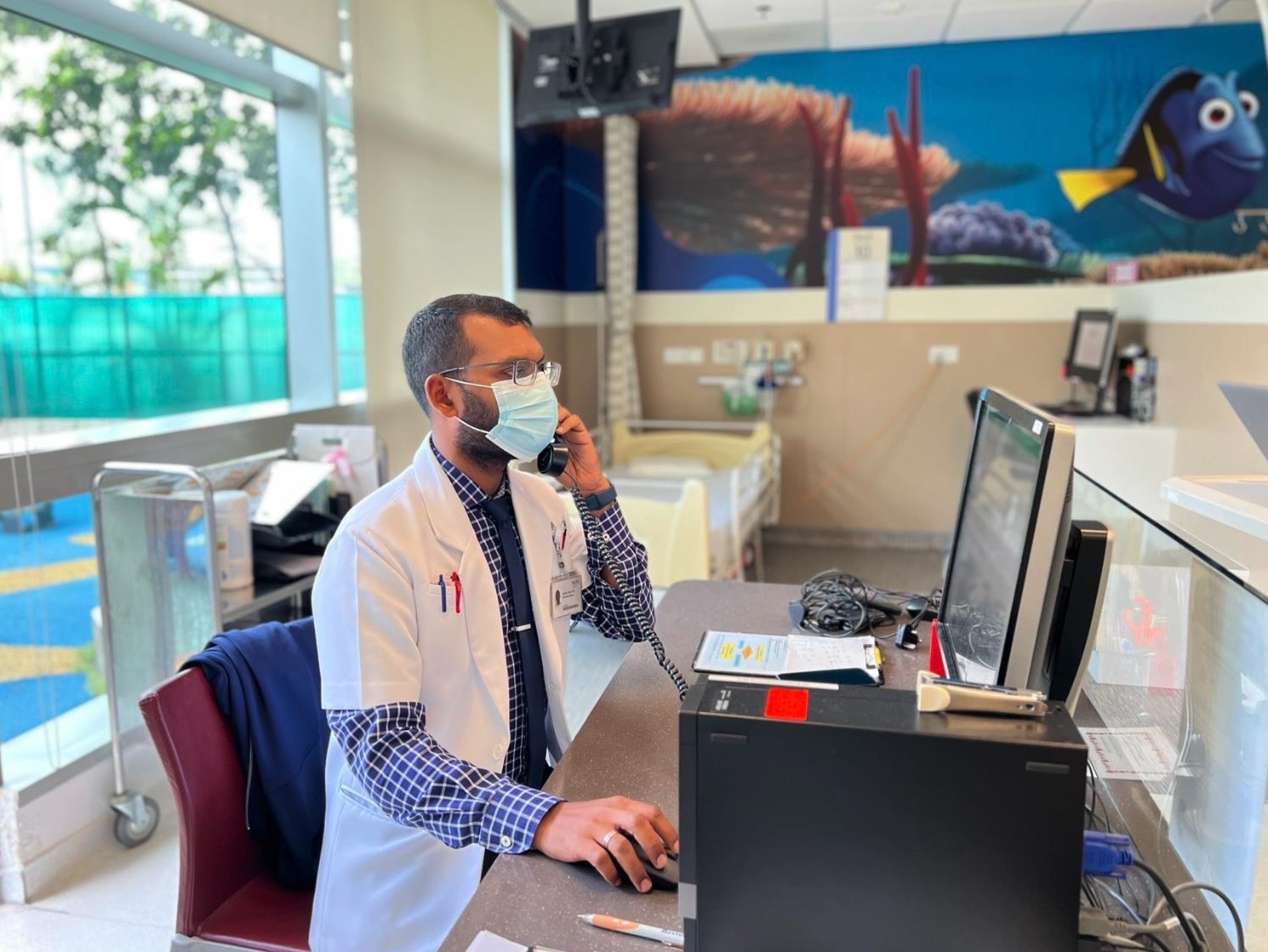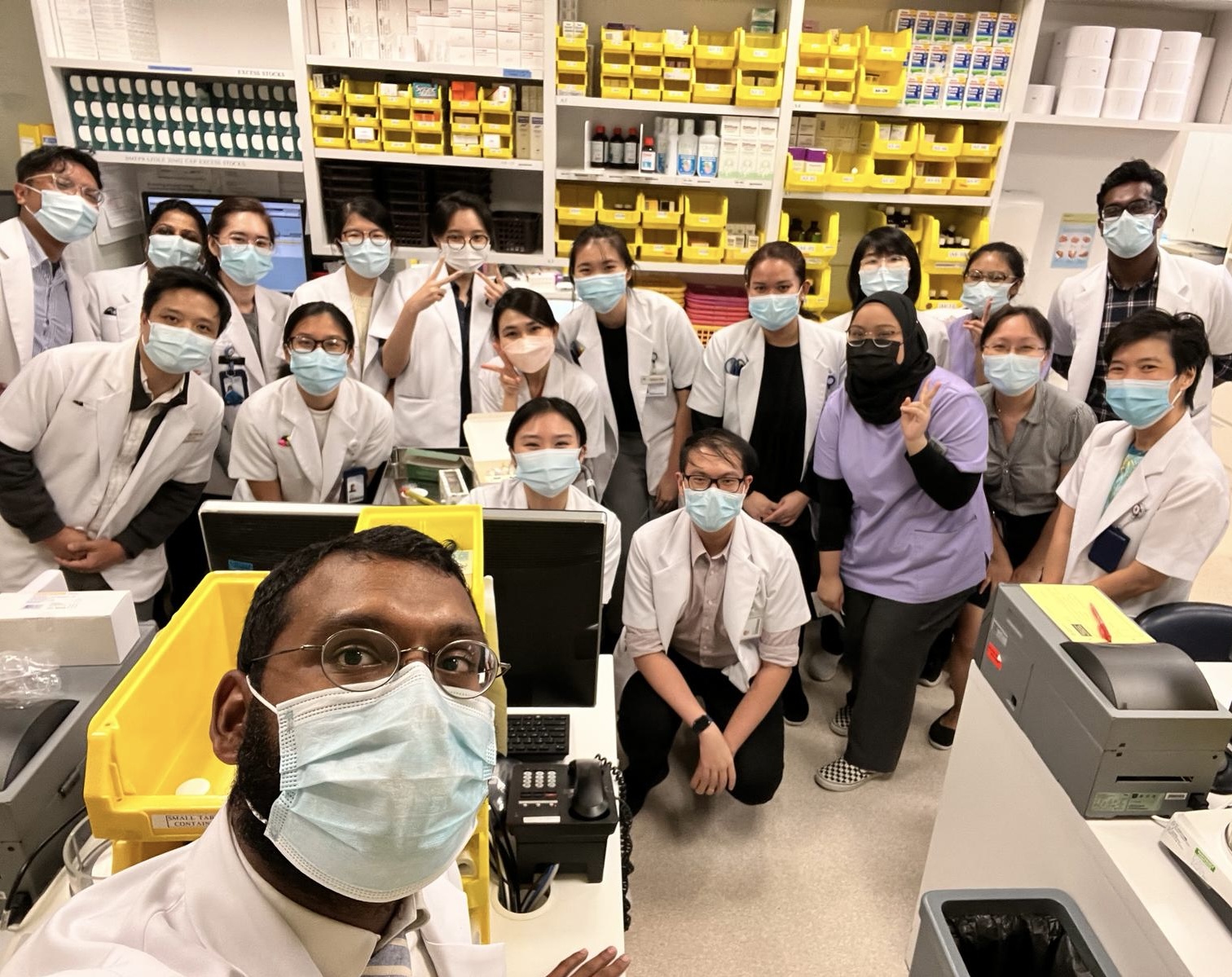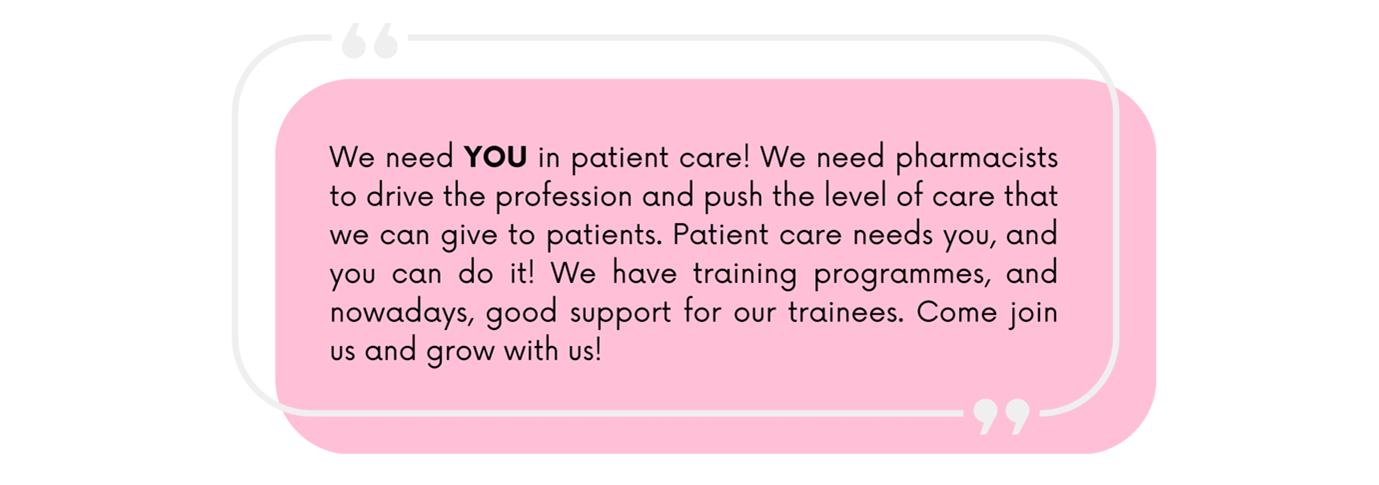Collaborative Care in Oncology: A Conversation with Imran (Class of ‘18)
Imran’s journey began with a simple desire: to find a profession that resonates with his love for therapeutics and his intrinsic drive to excel as a drug expert. He pursued his undergraduate studies in Pharmacy in National University of Singapore and graduated in 2018. Upon graduation, he began his professional journey as a pre-registration pharmacist at Raffles Hospital, after which he continued as a pharmacist at the Raffles Cancer Centre. In the interest of pursuing further training, he then moved to National University Hospital, where he currently dedicates himself to enhancing the quality of care for cancer patients at the Oncology Pharmacy. In 2021, he pursued post-graduate education to further refine his expertise, undertaking a Masters in Clinical Pharmacy at Queen’s University Belfast.
Why Pharmacy, and Why the Focus on Oncology?
It was during his pre-registration training at Raffles Medical Group that he first encountered the profound impact a pharmacist can have in cancer treatment. Through working with the multidisciplinary team, Imran discovered the pivotal role pharmacists play, not merely as dispensers of medication, but as an integral member of a team of healthcare professionals planning patient care strategies and making treatment decisions collaboratively.
What sets oncology apart, in his eyes, is the pronounced involvement of pharmacists in every step of the treatment journey. From navigating complex cases to managing intricate medication regimens tailored to individual patients, the challenges of oncology fuel Imran’s passion and excitement. He sees the role of the pharmacist extending beyond medication administration to symptomatic management. For Imran, the opportunity to address not just the cancer itself, but also the treatment-associated side effects like neutropenia and vomiting, underscores the holistic approach to patient care that defines oncology pharmacy. Furthermore, seeing his patients regularly, every three weeks or monthly enables him to build relationships with his patients.
A Day in the Life of an Oncology Pharmacist

As an oncology pharmacist, Imran undertakes a range of responsibilities required in this highly specialised field. A unique area of his duties lie in the meticulous preparation of chemotherapy drugs in a clean room, ensuring precise compounding and storage so that patients will receive safe and effective medications. Imran also reviews and verifies the dosages and treatment regimens. To optimise efficiency and minimise waiting time for patients, many of these prescriptions undergo these checks prior to patients arriving at the hospital for their chemotherapy sessions.
When he dispenses medication to his patients, Imran actively engages them to find out more about their overall well-being throughout their chemotherapy treatment journey. He finds immense gratification in the strong connections he forms with patients, relishing the moments when returning patients warmly greet him. These are testaments to the lasting impact of care which pharmacists can achieve.
When the Going Gets Tough, We’re Tougher Together!
During the intense hours of work, when stress mounts and the workload surges, Imran shares that cohesive and effective teamwork forms the bedrock in overcoming challenges together.
In the realm of oncology, physicians who are often engaged in diagnosing and determining treatment plans, entrust tasks such as dosing adjustments and side effect management to pharmacists. Pharmacists often field calls for dosage advice or patient-related concerns. “In such a complex field, we can make clinically significant interventions with little effort. This further cements our role in patient care as the drug experts”, said Imran.
Working hand-in-hand with nurses, pharmacists like Imran offer expert advice related to chemotherapy administration in moments of uncertainty. Close partnerships with trial coordinators and social workers facilitate the smooth navigation of clinical trials and reimbursement issues, respectively. Maintaining a good relationship with housekeepers is equally important, as their meticulous cleaning ensures a safe environment for aseptic chemotherapy preparation.
The above are some of the examples that Imran shared to illustrate the interconnectedness of various professionals and how strong teamwork is essential in the demanding landscape of oncology. Mutual support is indispensable in the provision of good patient care.
Imran also shared that within the team, pharmacists work closely with pharmacy technicians to ensure medicines are packed efficiently and correctly to reduce waiting time. As one of the largest cancer care units in Singapore, Imran’s team often has a high patient load. Close co-ordination between pharmacists also ensures that everyone receives support when they need it and consult one another in difficult situations: clinical or operational. “We’ve learnt how to work as one body”, Imran added. Truly, teamwork makes the dream work!


Pause and Recharge – Alone and Together!
In his typical day-to-day work, Imran stresses on the importance of taking occasional breaks to recharge and refocus his mind, especially when handling conflicts or managing difficult situations. Taking a brief pause for a snack allows him to replenish his energy and approach his responsibilities with renewed clarity and determination. This practice not only benefits his individual wellbeing but also fosters a cohesive team to collectively navigate the complexities of their work.

Hearteningly, he shares that his team prioritises looking out for one another’s welfare, readily offering encouragement and support when a colleague needs to step away for a moment of respite. Such gestures contribute to a culture of mutual respect and understanding within their team. As pharmacy technicians are integral members of the Pharmacy team in providing optimal care for patients, Imran reminds us to always express our gratitude for their tireless effort and dedication.
At the end of a hard day’s work, what he anticipates most eagerly is unwinding with his family! With children to go home to, the sight of their cheerful faces infuses him with a renewed sense of energy, ready for yet another day of caring for cancer patients.
Imran = Dexamethasone?
When asked “What drug best describes you?”, Imran responded with the following:
“Dexamethasone, because of the multi-faceted use of the drug! Dexamethasone is used for nausea and vomiting, symptoms of brain metastasis and to prevent hypersensitivity reactions, among other uses. This is just like my role as a pharmacist where we often have to wear many hats. Not only that, I am a father, a team leader, counsellor and more! Dexamethasone is not the main treatment of the disease, but rather, it is a treatment given alongside chemotherapy to manage symptoms and ensure that treatment can go to completion, just like my role as a pharmacist and how pharmacists and physicians come together to treat our patients effectively with better quality of life.”
Forward Perspectives: The Expanding Horizons of Oncology Pharmacists
We asked Imran to share his perspectives on the future landscape for oncology pharmacists. His enthusiasm and positive outlook are infectious. He said:
“The buzz around clinical services is palpable, and rightfully so. There is immense potential in running clinics, an area we must harness with a growth mindset. Yet, there is a lot we can do even without running clinical services. There is a wealth of opportunity in making clinically significant interventions, guiding treatment decisions, and providing unwavering support to patients throughout their treatment journeys. I cannot help but feel that we are operating below our full potential, below what our licences empower us to achieve.
I particularly enjoyed attending conferences like HOPA every few years! It is always inspirational looking at oncology pharmacists in more mature healthcare systems, like those in the United States or even in some parts of Asia. However, it is not enough to simply emulate their practices. We must tailor them to suit our local context and unique environment, considering factors such as patient’s culture and health system capabilities.
Many leaders within hospital systems and departments are also increasingly supportive of pharmacists taking on more substantial roles. The landscape is brimming with opportunities, and the momentum is undeniably thrilling. Yet, to truly seize these opportunities, we must shed any inertia holding us back and propel forward.”

To Aspiring Pharmacists:
As our conversation drew to a close, we asked Imran for any parting messages to aspiring pharmacists and here is what he passionately and enthusiastically exclaims:

We extend our heartfelt gratitude to Imran for generously sharing his invaluable experiences and unwavering dedication with us. As an oncology pharmacist, Imran’s passion is truly inspiring. We wish Imran continued growth in his journey as an oncology pharmacist, with a fulfilling path ahead as he reaches new heights and makes significant contributions to the field!
Article by Song Meow Ying (Year 3 Pharmacy student, Director of 63rd NUSPS Pharmacy Profession Awareness Committee), Chong Zi Hao Joe (Year 1 Pharmacy student, Vice-Director of 63rd NUSPS Pharmacy Profession Awareness Committee) and Yeo Jun Yuan Oliver (Year 4 Pharmacy student)
Share this article:
Stay connected with NUS Pharmacy!
Receive PharmConnect Newsletters & announcements by NUS Pharmacy.
